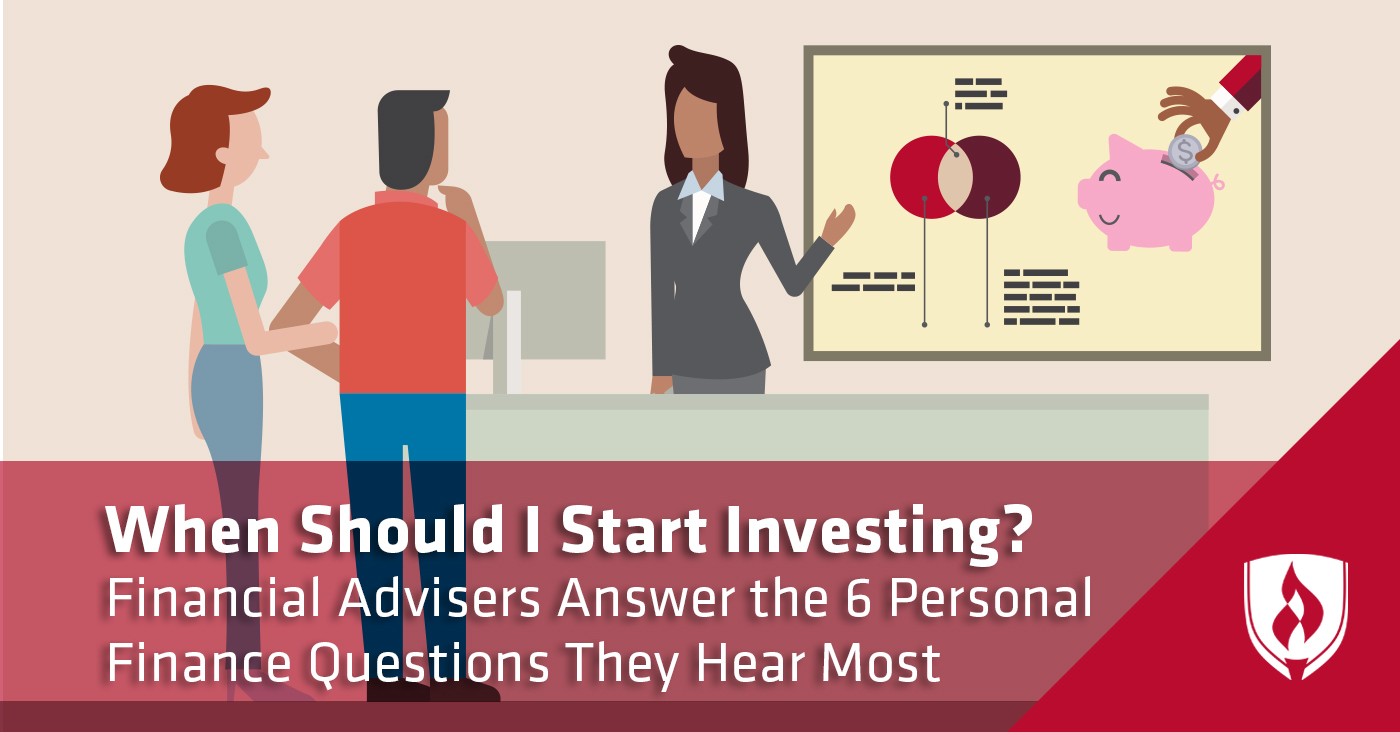When Should I Start Investing? Financial Experts Answer the 6 Personal Finance Questions They Hear Most
By Brianna Flavin on 01/04/2018

Many people hear words like “portfolio” or “investing” and feel a sense of bewildered panic. These words sound like they belong in the mouths of wealthy, middle-aged people sipping champagne as they track the stock market. But is the idea of investing and sound financial management really that complicated or unattainable for most?
“A common misconception is that finances are complicated and expensive,” says Krista Neeley, managing VP of Appreciation Financial. “But your finances will only grow if you start saving and stay committed.”
It’s hard to think ahead in finances when you are having a hard time making ends meet. But you don’t have to be wealthy or far along in life to make changes that can help secure your future. Neeley emphasizes that starting even the smallest thing—a savings account, a good habit or a small investment—can be transformative when you have time on your side.
So whether you like the thought of getting a handle on your money or feel like running the other way when financial talk comes up, financial experts have advice to meet you where you’re at. These professionals offered some of the questions they hear most often—and their answers.
6 Commonly-asked questions for financial advisors
1. When should I start investing?
“Start investing the first moment you are able to,” says Michael Landsberg, Partner at Landsberg Bennett Private Wealth Management.“Put time to work for you.” Landsberg explains that time is one of the only elements of investing you can really control. Thanks to compounding, even a tiny amount of money can become substantial over thirty or forty years.
“The earlier you start, the better the results will often be. It doesn’t have to be big, but it should be something.”
2. How can I pay off student loans when I’m barely getting by?
Even a pretty small student loan by today’s standards is a big chunk of change. If your bills have you scrambling every month, clearing a student loan can feel impossibly out of reach. Financial educator and blogger, Kate Horrell, says the first step is doing what you can to avoid living paycheck-to-paycheck.
“Figure out where your money is going,” Horrell says, and recommends using a spending tracker app to account for every penny for a month or two. “Then figure out where you can cut back. Analyze your spending, and identify needs versus wants.” Horrell says making progress in this way requires commitment and focus.
“Avoid taking advantage of the different repayment plans with lower payments unless you have no other option,” Horrell says. “You may have to do things that seem drastic, like moving back in with your parents or cutting your grocery budget to beans and rice. But you will be so glad you did!”
“You are used to living on next to nothing as a student,” says Debbi King, personal finance expert and motivational speaker. “So you need to continue to do so and aggressively pay off the debt.” If you still live like a college student even after you’re working a better job, applying any surplus to your debt, you will pay it off much quicker. “Remember, all of this is temporary just until you pay it off,” King says.
3. How do I start building credit?
If you have a bad credit score, you might run into trouble when applying for loans or insurance coverage. But the system of credit scoring can be confusing.
“There is a lot to know about credit scores, so doing personal research is key,” says Alayna Pehrson, manager of Best Company’s Credit Repair vertical. Pehrson says it’s important to know what factors affect a credit score. “Payment history makes up 35 percent, amounts owed makes up 30 percent, length of credit history decides 15 percent, new credit makes up 10 percent, and credit mix adds up 10 percent of a score. Overall, the more you know, the more likely you are to build good credit.”
Once you have a general grip on how credit works, building credit doesn’t have to be difficult. “Credit cards are the most effective way to build credit in this day and age,” Pehrson says. “There are a few other options, like applying for an installment loan, making payments (like rent payments) on time and having them sent to credit bureaus and becoming an authorized user on someone else’s card.”
If you have traditionally avoided loans and credit cards, you might lack a credit history altogether. Even though that seems like a good financial place to be, it can make it hard to obtain a loan with favorable terms for something like a house without a credit trail behind you. “Basically, the sooner you start, the better—whether that includes credit cards or not,” Pehrson says.
4. Should I save for retirement or invest when I still have loans to repay?
It’s hard to think about retirement and investments when you are still encumbered with loans, but according to Galen Herbst de Cortina, lead planner at Buff Your Finances, you should analyze the situation for a moment. “If you have an employer match in a retirement account, save right away and maximize the matching funds,” Herbst de Cortina says.
If you don’t have an employer match, it depends on how high the interest rate is on your student loan. “If it’s six percent or higher, than I say focus on paying the student loans. Stock market returns are generally higher than six percent, but you know you’re getting that steady payoff when you minimize loans.”
Basically when it comes to funds you don’t need for immediate use, Herbst de Cortina says the first step is to make sure you have an emergency fund that can cover at least 3–6 months’ worth of expenses. Next, focus on contributing up to the match level on any employer retirement plan you have. After that it gets a little more complex—if you have loans with high interest rates, you’ll likely be better served focusing on paying those down instead of investing more into a retirement account. That said, every situation is different and there isn’t always a clear “right” approach—that’s part of the reason why this is such a common question for financial advisors!
5. How can I save money?
Investing, retirement planning and paying loans all require some savings. So how do you build up extra funds? While this question can lead to a thousand different answers, according to Neeley, it’s all about your perspective. “Savings habits are difficult for people because they perceive it as a loss, rather than a replacement.” Neeley explains that seeing that money “disappear” into a savings account or out of your income can make us feel like we are losing it. This perspective makes saving hard.
“You should always remember that one of the primary principles to building wealth is to pay yourself 10 percent. That's money you've earned and deserve to keep.” If you view your savings account as long-term money for you, it can feel gratifying instead of limiting. “We have so many bills to pay—sometimes we forget to get ourselves onto that list!”
As a practical step, Neeley recommends setting up an automatic transfer at your bank, to swap money from your checking account into your savings account every month. “You can also use a third-party app like Digit to help you save each month. This is a great tool when saving for a trip or something fun that's a few months out. You will surprise yourself with how much you can save in small increments.”
6. What is financial planning?
Financial planning basically means looking into the future for yourself financially and taking steps to make that future secure. “Our financial health and strength is just as important as our mental, emotional and physical health and strength,” Neeley says. “Taking time to better understand and empower yourself financially can be the backbone to the freedom, flexibility and peace of mind you desire for your future.”
Many people prefer not to think about their finances and avoid financial planning altogether, but this approach can be damaging. Taking a good look at your finances and doing a little research into budgeting, retirement and investments as soon as possible will give you more time to compound your assets, fix any problems before they become expensive and get a good head start on your financial future. “Having a strong, stable foundation for your finances is the easiest way to create a bright future in all other areas of your life,” Neeley says.
Speaking of bright futures…
As you can see, the world of finance doesn’t have to be intimidating. In fact, taking control of your personal finances can be incredibly empowering. If you enjoyed reading up on these financial FAQs, maybe you should consider a career in finance—after all, it can be incredibly rewarding to help others develop a firm financial foundation. Check out our article, “8 Signs You Have What It Takes to Major in Finance” to see if you might be a fit.
RELATED ARTICLES:




